Overview
The article "9 Ways to Stay Focused and Boost Your Productivity" primarily aims to equip readers with effective strategies for enhancing concentration and productivity in both work and study environments. It underscores the critical importance of:
- Identifying distractions
- Maintaining both mental and physical health
- Leveraging automation tools such as Casy
Furthermore, it advocates for the implementation of structured planning techniques, all of which play a vital role in fostering improved focus and efficiency.
Introduction
In an age where distractions lurk just a notification away, maintaining focus presents a formidable challenge for many. This ability to concentrate profoundly impacts not only productivity but also the quality of work produced. This article explores nine effective strategies designed to enhance focus and boost productivity, ranging from leveraging automation tools like Casy to creating a distraction-free workspace. With numerous potential interruptions at every turn, how can one effectively reclaim their concentration and maximize their work hours?
Casy: Automate Task Management for Enhanced Focus
Casy operates as an invisible project manager, seamlessly integrating with chat platforms like Slack and Telegram. By automatically capturing key information from conversations, it transforms discussions into actionable items, sets deadlines, and updates documents without requiring manual input. This level of automation allows teams to stay focused on their primary activities, significantly decreasing the time dedicated to administrative duties and enhancing overall productivity. With features like project planning and responsibility categorization, Casy offers complete visibility of duties, ensuring that teams can stay focused in high-speed environments.
Consider the impact of automation on your organization. Case studies highlighting the Casy project management tool reveal that businesses implementing automation experience improved employee engagement and faster project delivery. For instance, 57% of surveyed companies reported better employee engagement after implementing robotic process automation (RPA). Bill Gates observed that automation enhances efficiency in effective operations, while Clara Shih emphasized that strategic automation liberates time for activities uniquely suited for humans.
In today's fast-paced work environment, teams must stay focused on using automated task management tools like Casy to optimize workflows and enhance efficiency. They empower teams to innovate without the burden of conventional project management complexities. Are you ready to transform your team's productivity? Embrace the future of project management with Casy and unlock your potential.
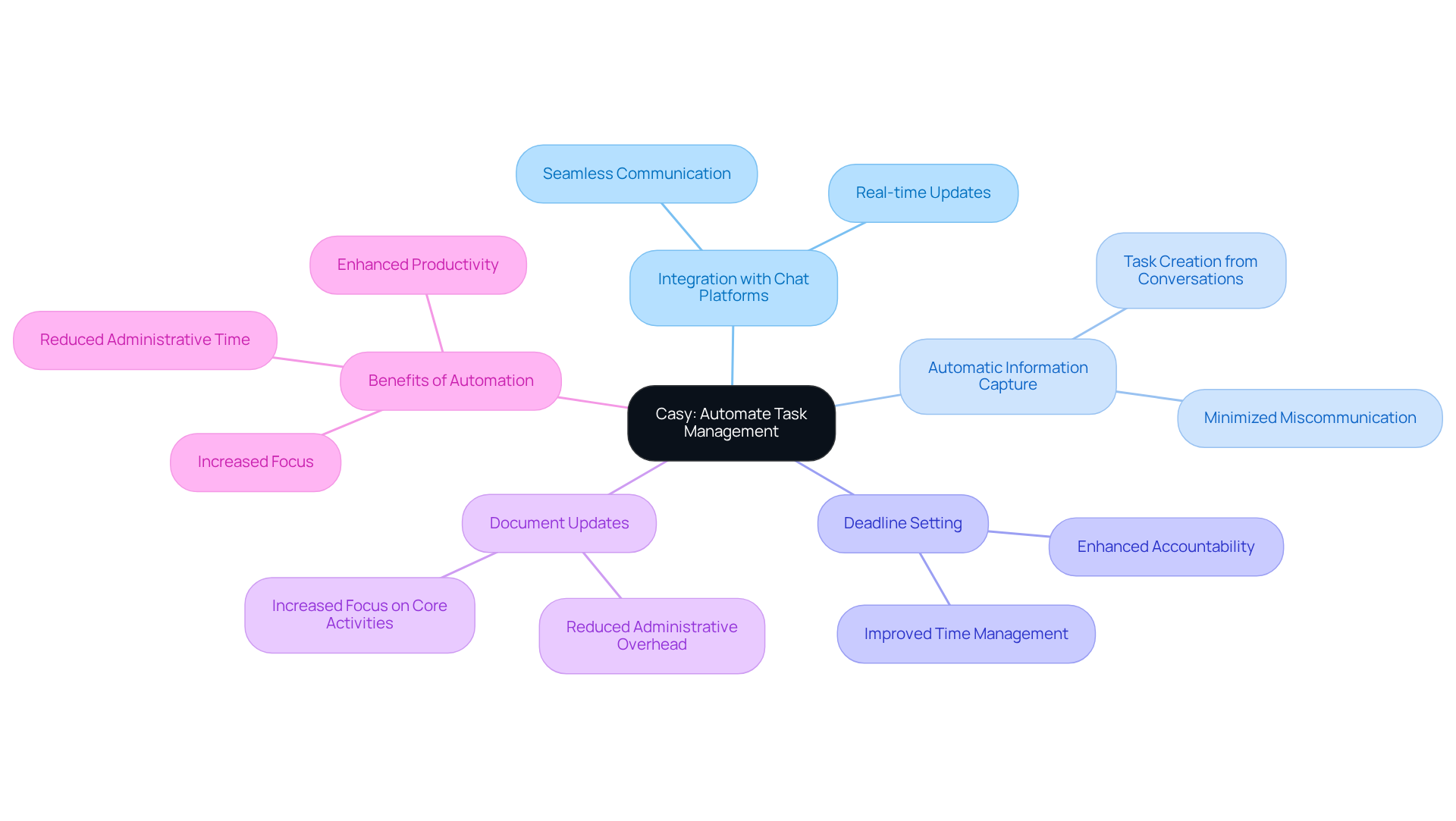
Identify Barriers to Concentration: Understand What Distracts You
To stay focused, it is essential to identify your specific distractions. Common culprits include:
- Notifications from devices
- Social media
- Environmental factors such as noise
Did you know that 90% of employees consider their cell phones the largest workplace distractor? Furthermore, 73% feel overwhelmed by constant interruptions. This highlights a critical issue: 50% of employees report that stress or anxiety obstructs their job performance, underscoring the need to stay focused to combat the significant impact distractions have on efficiency.
Keeping a distraction journal can help you pinpoint these triggers, allowing for targeted strategies to mitigate them. For instance:
- Silencing notifications
- Creating a dedicated workspace
These strategies can significantly reduce interruptions. Additionally, employees spend an average of 21.5 hours per week in meetings, with nearly half deemed unproductive. This statistic reinforces the urgent need for effective time management.
Understanding your unique obstacles to concentration allows you to stay focused and develop customized techniques, ultimately leading to enhanced efficiency and reduced stress. Are you ready to take control of your focus and improve your productivity?
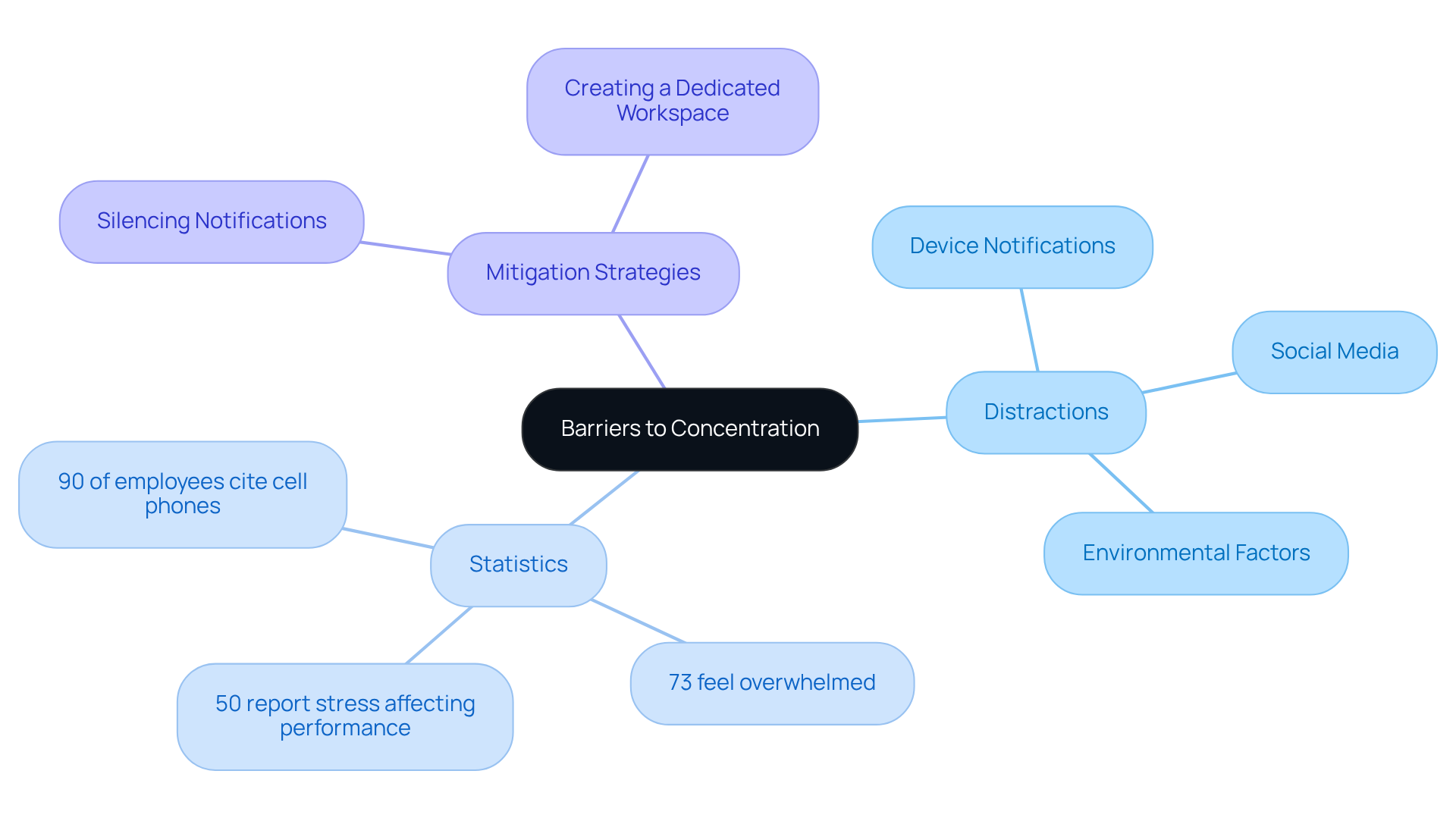
Prioritize Mental Health: Strategies for Maintaining Well-Being
To achieve peak efficiency, it is essential to stay focused on maintaining mental well-being. Consider this: how often do you take regular breaks? Implementing strategies such as mindfulness practices and setting realistic goals can significantly help manage stress and prevent burnout. Engaging in activities that support mental well-being—like meditation or simply conversing with a friend—can help you stay focused and enhance your concentration. Remember, a healthy mind is essential to stay focused effectively. Therefore, prioritizing mental well-being is crucial for anyone looking to boost their efficiency.
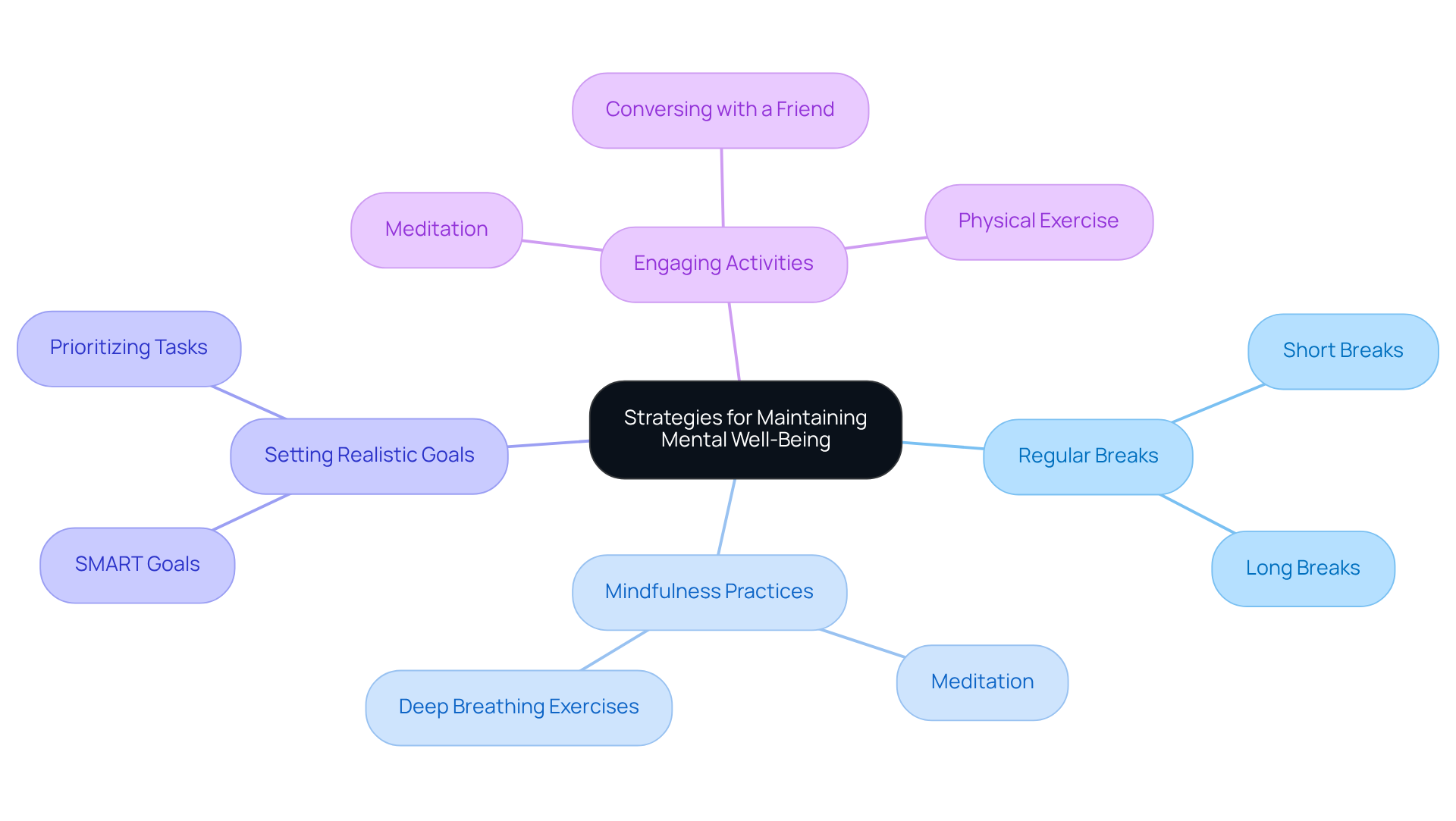
Maintain Physical Health: Exercise and Nutrition for Better Focus
To enhance productivity, it is essential to maintain physical health in order to stay focused. Regular exercise significantly boosts blood circulation to the brain, which is crucial for cognitive function and focus. Studies indicate that engaging in moderate-intensity physical activities, such as brisk walking or cycling, can lead to notable improvements in memory and attention. For instance, research shows that even a small increase in physical activity can enhance cognitive performance for up to 24 hours post-exercise. Furthermore, dog owners walk on average 22 minutes more each day compared to non-dog owners, illustrating how regular activity can seamlessly integrate into daily life.
In addition to exercise, a balanced diet rich in nutrients plays a vital role in supporting brain health. Foods high in omega-3 fatty acids, antioxidants, and essential vitamins are linked to improved memory and cognitive function. For example, diets incorporating these nutrients have been associated with a 38% lower risk of developing Alzheimer’s disease among active individuals compared to their sedentary counterparts.
Incorporating physical activity into daily routines—whether through structured workouts or simple activities like walking—can help you stay focused and significantly improve concentration and overall cognitive performance. Adults need at least 75 minutes of vigorous-intensity activity weekly to maintain optimal health. Case studies have demonstrated that individuals who maintain regular exercise regimens exhibit better global cognition and working memory, underscoring the importance of an active lifestyle for optimal brain health. Moreover, regular exercise can reduce symptoms of depression by up to 50%, highlighting its mental health benefits alongside cognitive improvements. By prioritizing both exercise and nutrition, individuals can stay focused and effectively enhance their efficiency.
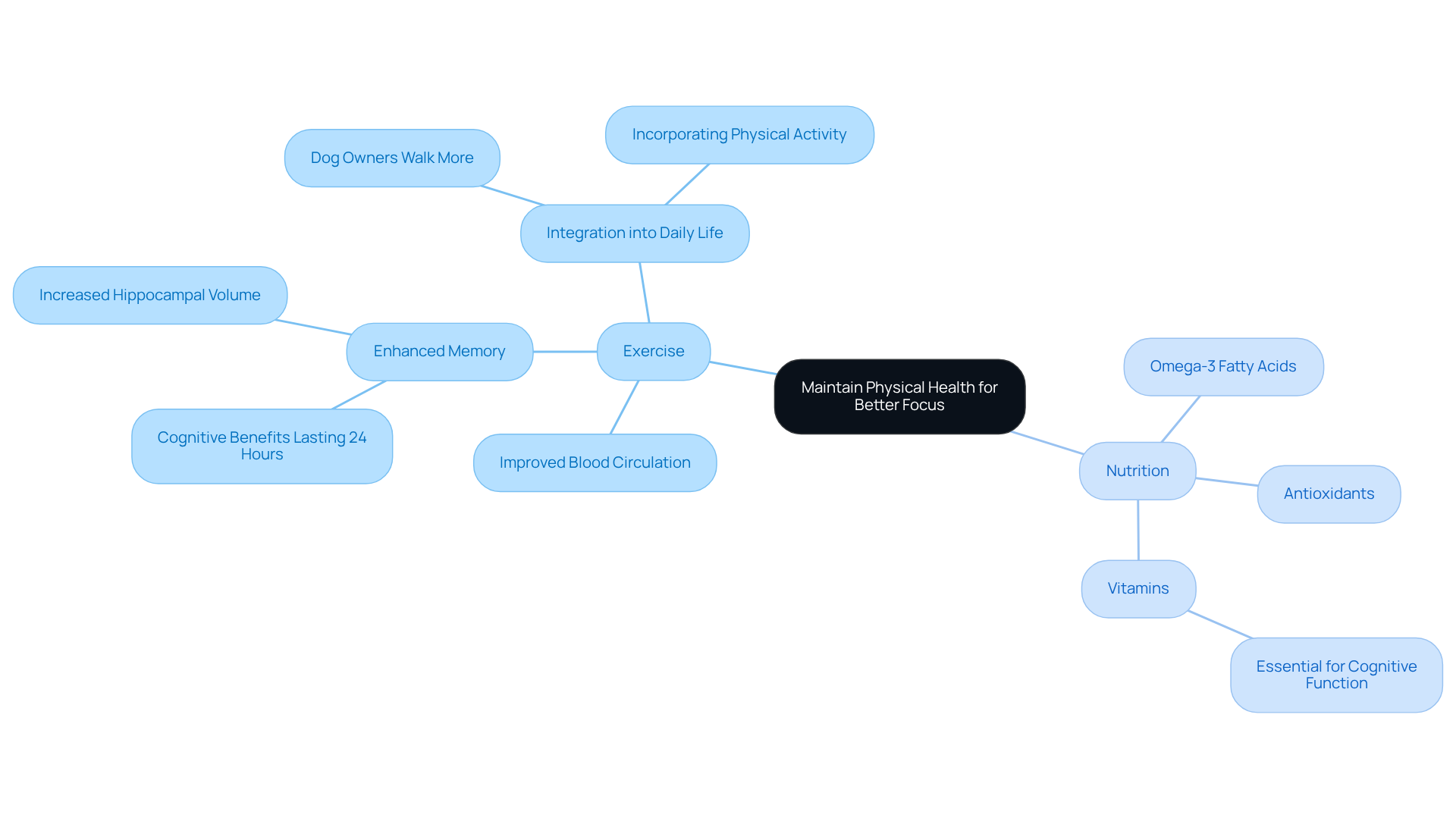
Minimize Distractions: Create a Focus-Friendly Study Environment
To create a focus-friendly environment, begin by decluttering your workspace. Are unnecessary items diverting your attention? Remove them. Consider utilizing noise-canceling headphones or playing soft background music to drown out distracting sounds. Additionally, ensure your workspace is well-lit and comfortable; physical discomfort can lead to distractions. By designing a space that minimizes interruptions, you can better stay focused on tasks. This intentional approach not only fosters productivity but also empowers you to tackle your challenges effectively.
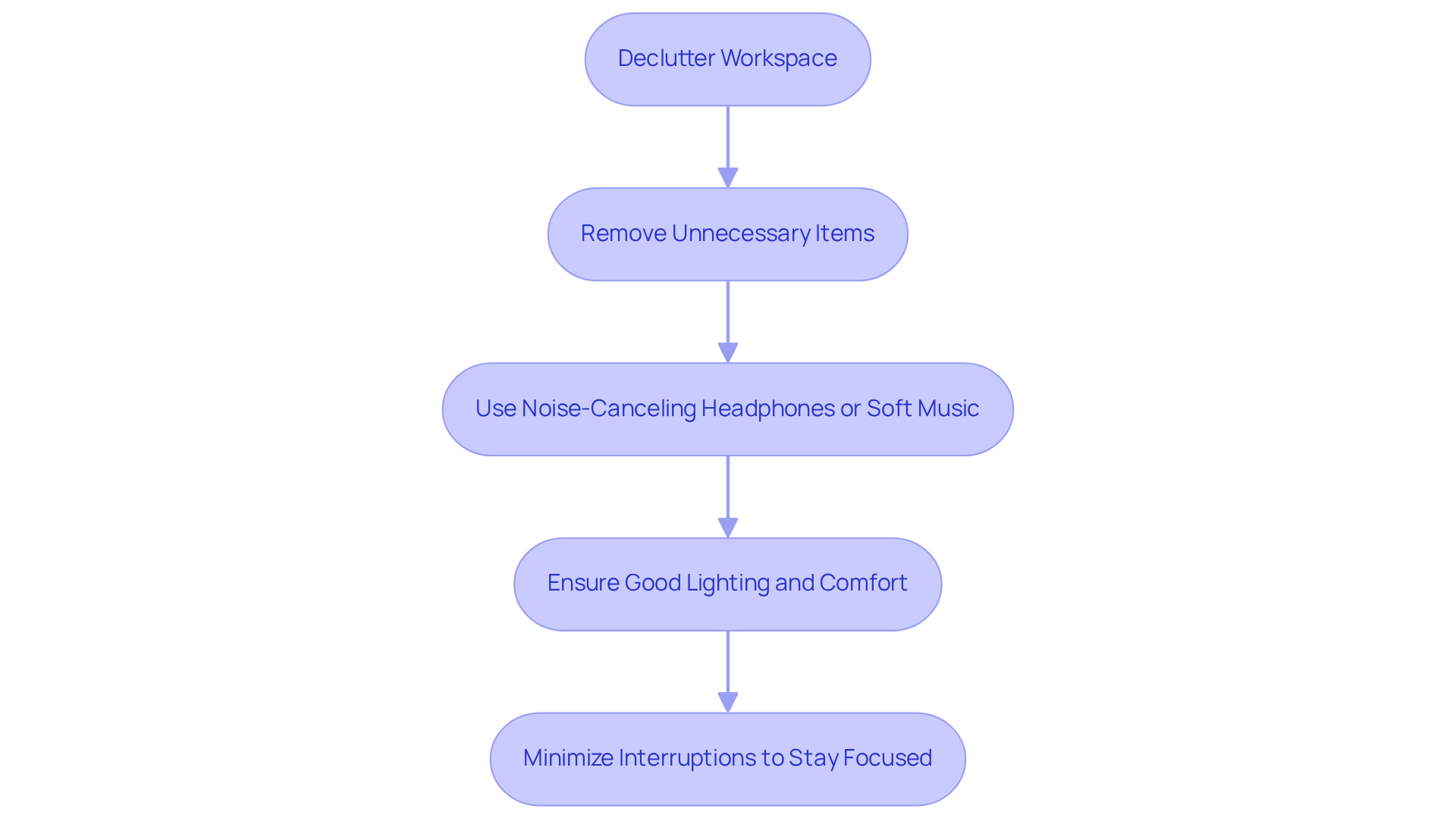
Use Focus Music: Enhance Concentration with the Right Soundtrack
Listening to the right type of music can help you stay focused, significantly enhancing concentration and productivity. Research indicates that instrumental music, particularly classical and ambient styles, fosters a soothing environment conducive to focus. A study revealed that participants engaging in challenging psychological tasks while exposed to various soundscapes—including office noise, pop/rock tunes, deep focus melodies, and workflow sounds—reported improvements in mood and cognitive performance, even among those experiencing high anxiety levels. This underscores the idea that the right soundtrack can create an optimal environment for task completion.
Curated playlists tailored for studying or working can help you stay focused and sustain a steady flow of concentration. For instance, the Peaceful Music playlist, curated by Max Richter, is designed to offer a restful experience amid the chaos of modern life, echoing the historical significance of music in fostering meditative states. Exploring a variety of genres is essential, as individual preferences significantly influence how music affects work output. While some may find classical compositions beneficial, others might gravitate towards ambient sounds or movie soundtracks. Ultimately, identifying the most suitable type of music for personal needs can help you stay focused, which can lead to heightened concentration and improved overall performance. As Ed Sheeran articulated, writing music serves as a positive outlet during challenging moments, highlighting the emotional benefits that music can provide while working.
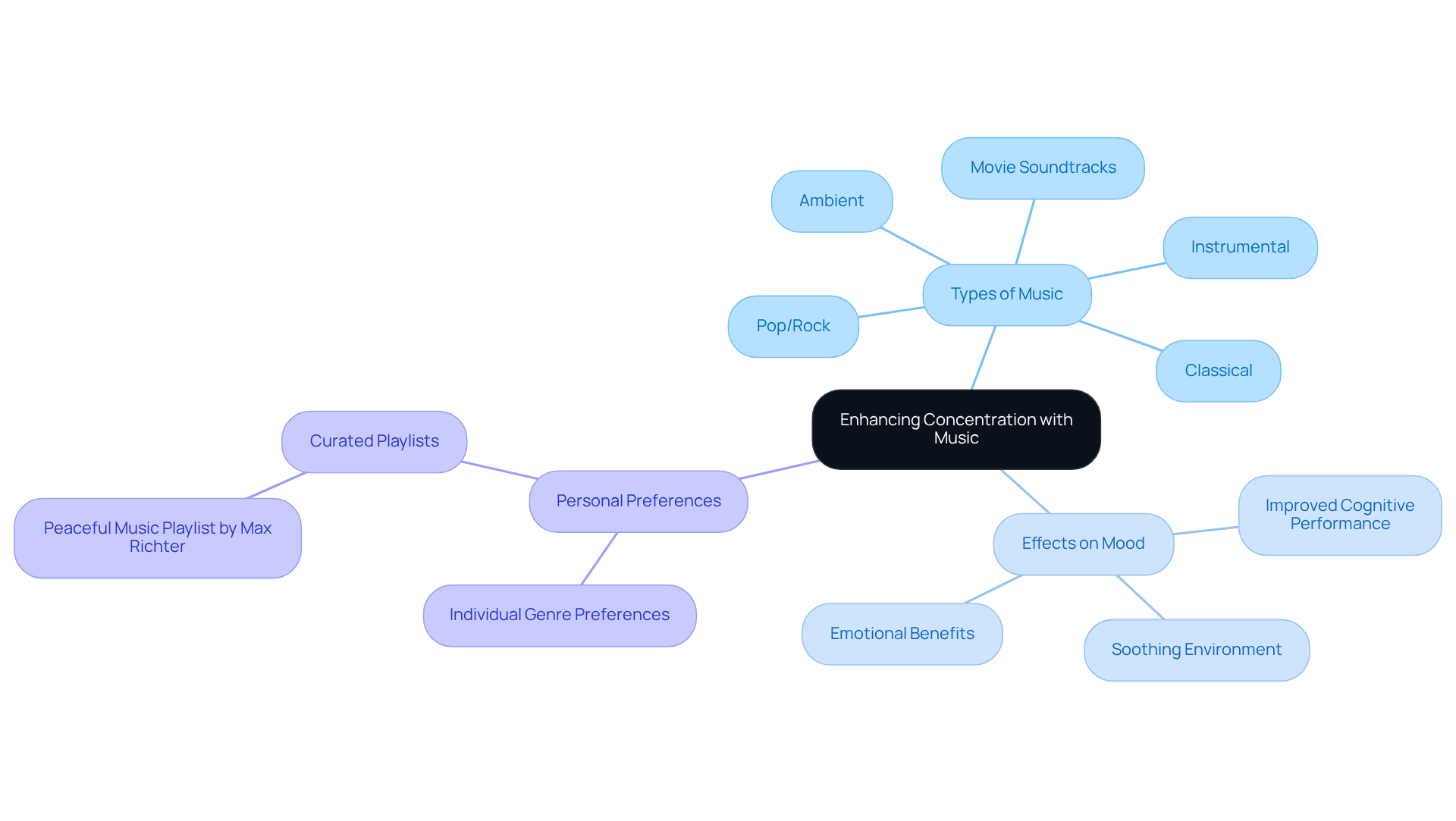
Plan Your Study Sessions: Organize Time and Tasks Effectively
Effective planning of your study sessions can significantly help you stay focused and enhance productivity. Start by establishing clear goals for each session, breaking larger tasks into smaller, manageable segments. Techniques such as time blocking or the Pomodoro Technique—where you work for a designated period followed by a brief break—are particularly effective. This structured approach allows individuals to stay focused and also mitigates burnout by incorporating regular rest intervals. In fact, research indicates that structured planning can lead to a 40% increase in productivity, making it an essential strategy for startups aiming to maximize efficiency.
Moreover, employing tools like Casy can streamline this process by automating task creation and deadline management. This enables you to focus on your primary activities without the burden of manual updates. Casy's commitment to data privacy ensures that your project information remains secure, which is crucial for startup founders who prioritize confidentiality. As Peter Drucker wisely stated, "Efficiency is doing things right; effectiveness is doing the right things." This underscores the critical role of effective planning in achieving your goals.
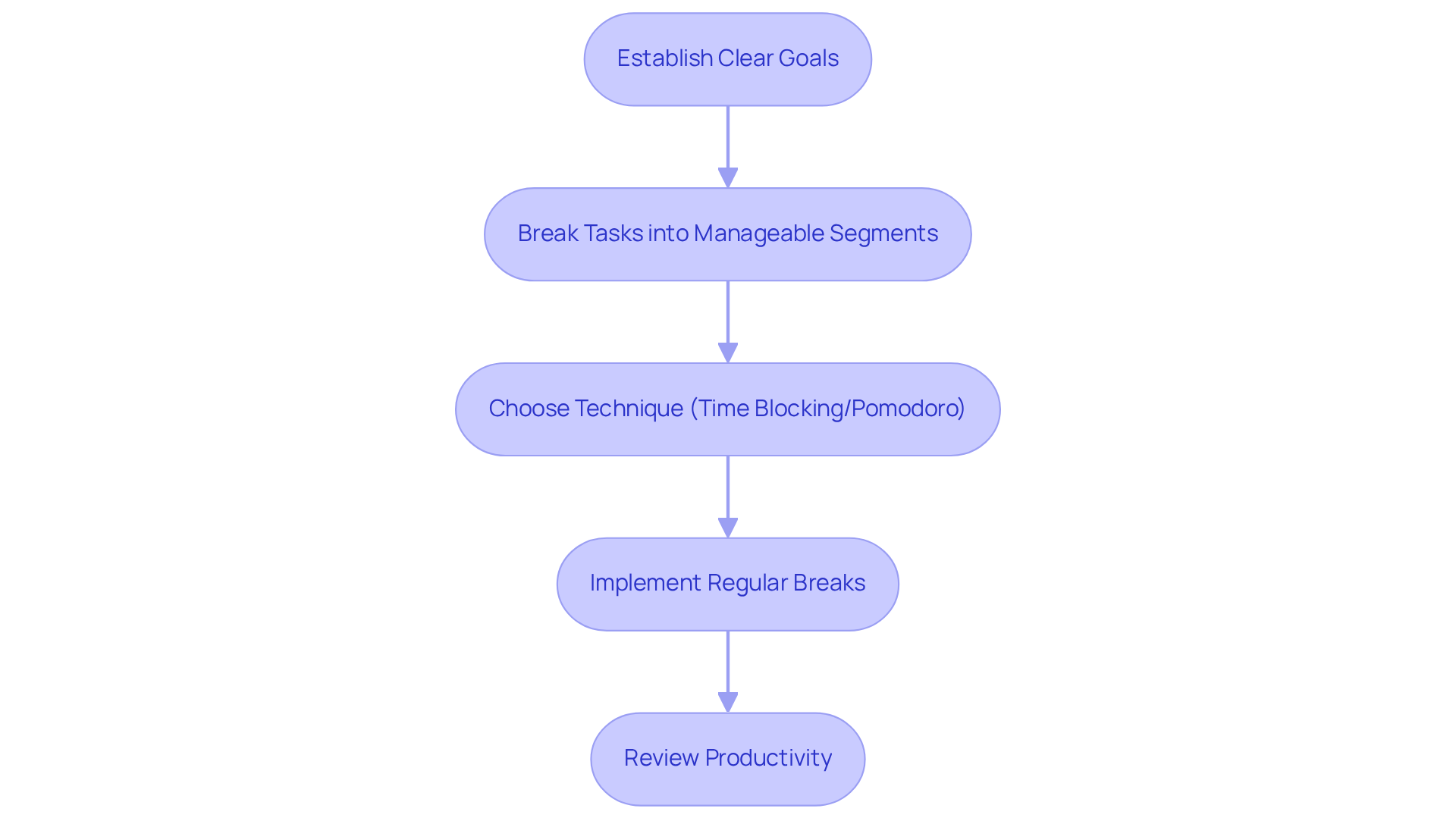
Implement Useful Tips: Simple Strategies to Boost Focus
To stay focused, implement straightforward strategies to enhance your focus. Start by setting specific goals for each work session. Utilize timers to instill a sense of urgency, and schedule regular breaks to recharge your mind. Mindfulness techniques, including deep breathing and meditation, can significantly clear mental clutter and sharpen concentration.
Have you considered the impact of multitasking? It often leads to diminished productivity and increased distractions. Studies show that organized work sessions, such as those in the Pomodoro Technique, featuring 25-minute concentrated work intervals followed by five-minute pauses, can enhance concentration and lessen mental exhaustion, making it simpler to remain engaged.
Furthermore, a 40-hour time-blocked work week produces the same output as a 60+ hour work week without structure, emphasizing the efficiency of structured work intervals. By integrating these practices into your daily routine, you can stay focused and create a more productive work environment, ultimately driving better results.
As Bruce Lee wisely stated, 'If you spend too much time thinking about a thing, you’ll never get it done.
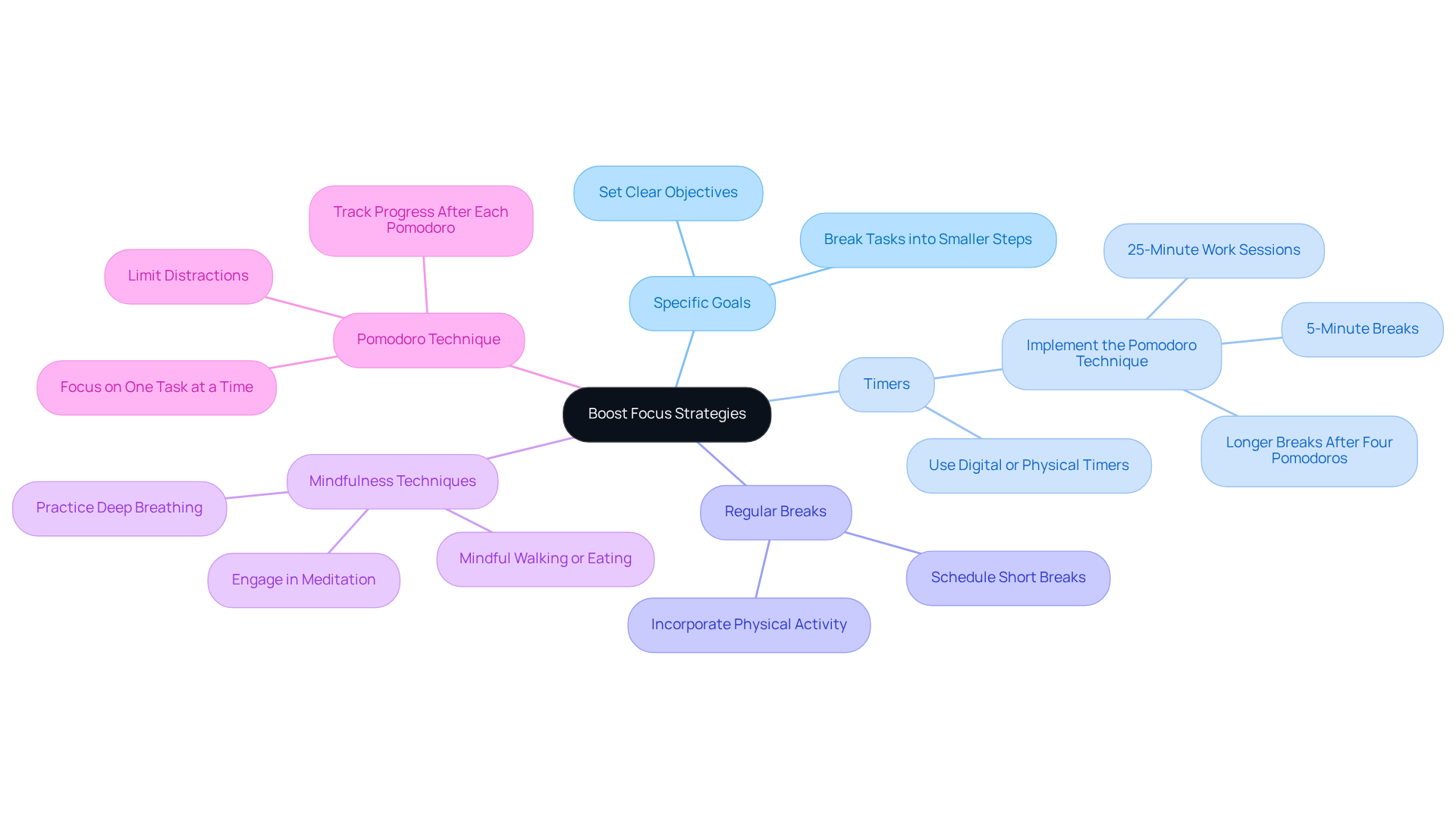
Regain Focus: Steps to Take When Concentration Wanes
When concentration begins to wane, it is essential to take proactive measures to stay focused. Start by stepping away from your workspace for a brief break. Stretching or taking a short walk can significantly clear your mind. Research suggests that individuals who take short breaks during activities can sustain their performance levels for up to 40 minutes. If distractions persist, consider altering your environment or switching tasks to refresh your perspective. Spending time in nature has been shown to positively affect cognitive function, making it a beneficial change. Techniques such as deep breathing or participating in a brief mindfulness activity can effectively restore your concentration.
It's essential to acknowledge that variations in attention are typical. Having methods ready enables you to quickly stay focused and maintain efficiency. Experts recommend incorporating 'active breaks'—like walking or meditating—to retrain your attention and improve cognitive function. Dr. Michael Ziffra notes that attention is similar to a muscle that can be built up with practice, reinforcing the importance of these active breaks. By implementing these techniques, you can stay focused and overcome challenges to sustain your productivity.
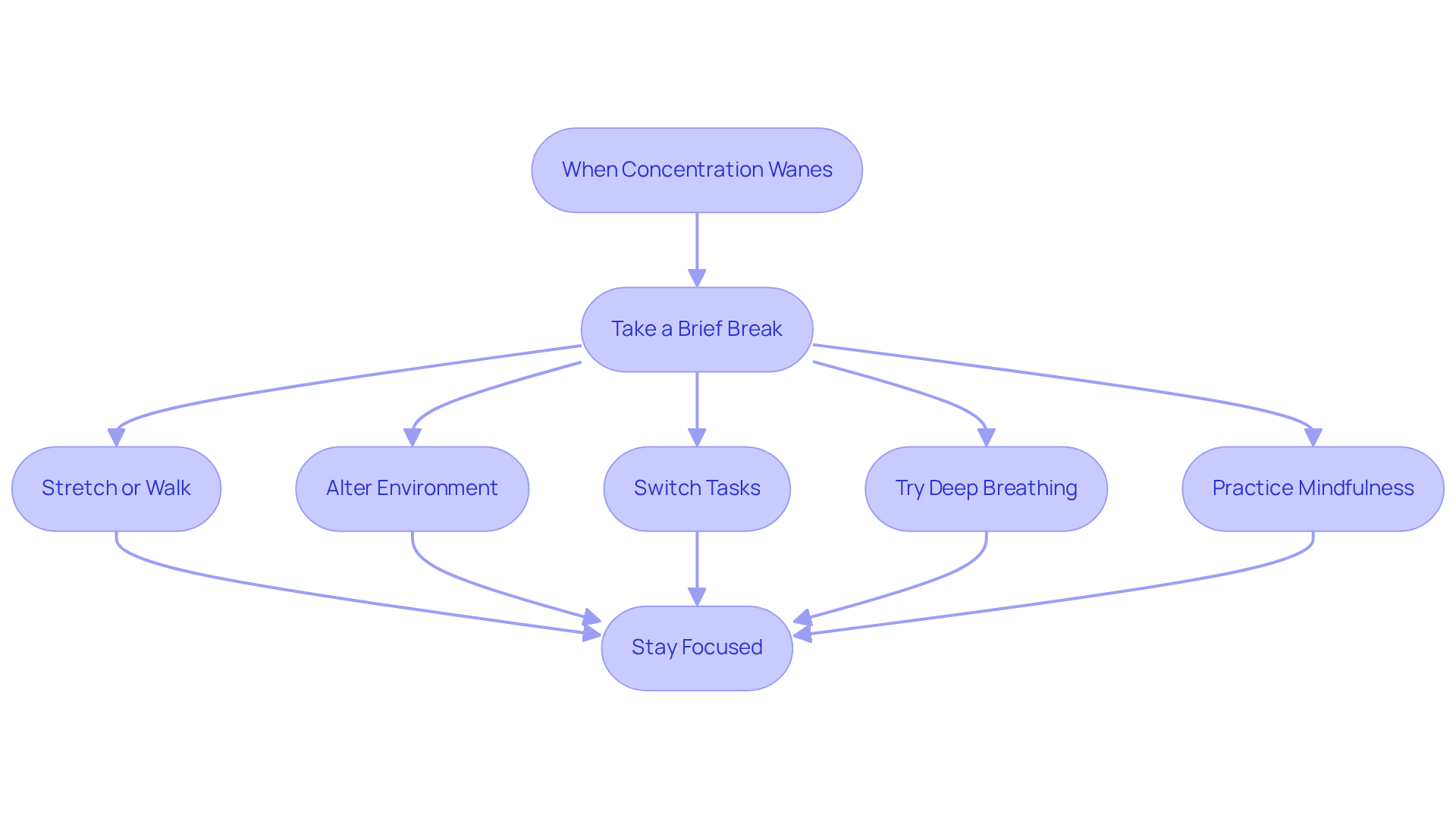
Conclusion
In a world filled with distractions, mastering the art of focus is crucial for enhancing productivity and achieving high-quality work. The strategies outlined in this article provide a comprehensive roadmap for reclaiming concentration and maximizing efficiency. By integrating automation tools like Casy, prioritizing mental and physical health, and creating a distraction-free environment, individuals can significantly improve their ability to stay focused and productive.
Key insights include:
- The importance of identifying personal distractions
- The benefits of structured planning
- The role of music in fostering concentration
Moreover, maintaining mental well-being through regular breaks and mindfulness practices is essential for sustaining focus over the long term. Each of these elements contributes to a holistic approach to productivity, empowering individuals to navigate the complexities of modern work environments effectively.
The significance of these strategies cannot be overstated. As distractions continue to proliferate, adopting these practices will not only enhance personal efficiency but also promote a healthier work-life balance. Embracing automation, prioritizing mental health, and creating conducive workspaces are pivotal steps toward unlocking full potential. By implementing these techniques, individuals can foster an environment that encourages focus and drives success in their professional endeavors.
Frequently Asked Questions
What is Casy and how does it function?
Casy is an automated task management tool that integrates with chat platforms like Slack and Telegram. It captures key information from conversations, transforms discussions into actionable items, sets deadlines, and updates documents automatically, allowing teams to focus on their primary activities.
What benefits does Casy provide to teams?
Casy enhances productivity by reducing the time spent on administrative duties, offering features like project planning and responsibility categorization, and providing complete visibility of tasks in fast-paced environments.
How does automation impact employee engagement and project delivery?
Case studies show that businesses implementing automation, like Casy, experience improved employee engagement and faster project delivery. For example, 57% of surveyed companies reported better engagement after adopting robotic process automation.
What are common distractions that hinder concentration in the workplace?
Common distractions include notifications from devices, social media, and environmental factors such as noise. Research indicates that 90% of employees view cell phones as significant workplace distractors.
What strategies can help mitigate distractions?
Strategies to reduce distractions include silencing notifications, creating a dedicated workspace, and keeping a distraction journal to identify triggers and develop targeted techniques.
How much time do employees typically spend in meetings, and how productive are they?
Employees spend an average of 21.5 hours per week in meetings, with nearly half of those meetings considered unproductive, highlighting the need for effective time management.
Why is prioritizing mental health important for productivity?
Maintaining mental well-being is crucial for achieving peak efficiency. Strategies such as regular breaks, mindfulness practices, and engaging in supportive activities can help manage stress and prevent burnout.
What activities can support mental well-being?
Activities that can enhance mental well-being include mindfulness practices, meditation, and social interactions, such as conversing with friends. These activities help improve focus and concentration.




